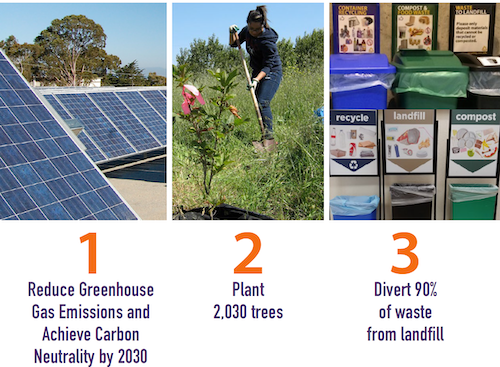Inclusive Sustainability Plan 2020

Three Core Goals
- Reduce greenhouse gas emissions and achieve carbon neutrality by 2030
- Plant 2,030 trees
- Divert 90% of waste from landfill
Download the Inclusive Sustainability Plan 2020.
To learn more, read CSU Monterey Bay's Carbon Neutrality Roadmap.
In addition, the goals and recommendations below specifically address the need to further align the work of sustainability and social justice.
Promote Inclusive Sustainability
We recognize that the impacts of environmental destruction and pollution disproportionately affect already marginalized communities by conscious design or systemic neglect.
Therefore, “Inclusive Sustainability” is a commitment to improve the environment and the lives of those living within it regardless of income, class or identity.
In fact, it seeks to promote all unique cultural and ethnic traditions that support, respect and provide stewardship for the earth and its resources.
Recommendations:
Encourage members of sustainability-focused groups to participate as members of diversity-focused groups, and vice versa.
Consult with diversity-focused stakeholder groups on and off campus to ensure all viewpoints are integrated into sustainability-related projects and/or programs. (This may include campus, local and regional partners and contractors)
Deepen the campus understanding of how sustainability and social justice are interconnected and respond to opportunities to address intersectional issues
We acknowledge that environmental degradation is directly and intricately related to social injustices. Many of the recommendations listed throughout this plan aim to support this goal.
Recommendations:
Integrate sustainability and environmental justice into existing and planned social justice, equity and inclusion trainings and integrate inclusion and social justice into any future sustainability or climate change trainings.
Examine campus service contracts and make social justice a criteria for doing business with the campus.
Ensure all students wanting careers in sustainability, environmental conservation, or similar fields are included and have access to opportunities that will further their professional ambitions
We recognize that barriers to participation for sustainability and environmental positions exist for marginalized community members who have equal interest and ambition to address environmental concerns.
Recommendations:
Support traditionally marginalized students holding positions in the Sustainability Office, or other dedicated sustainability student positions on campus (including but not limited to Dining, the Otter Cross Cultural Center and the Associated Student Sustainability Senator).
“Inclusion is all and while the motivation and avenue for supporting sustainability may vary, the collective effort and intention is shared.” (Nizhoni Chow-Garcia and Ana Hernandez)